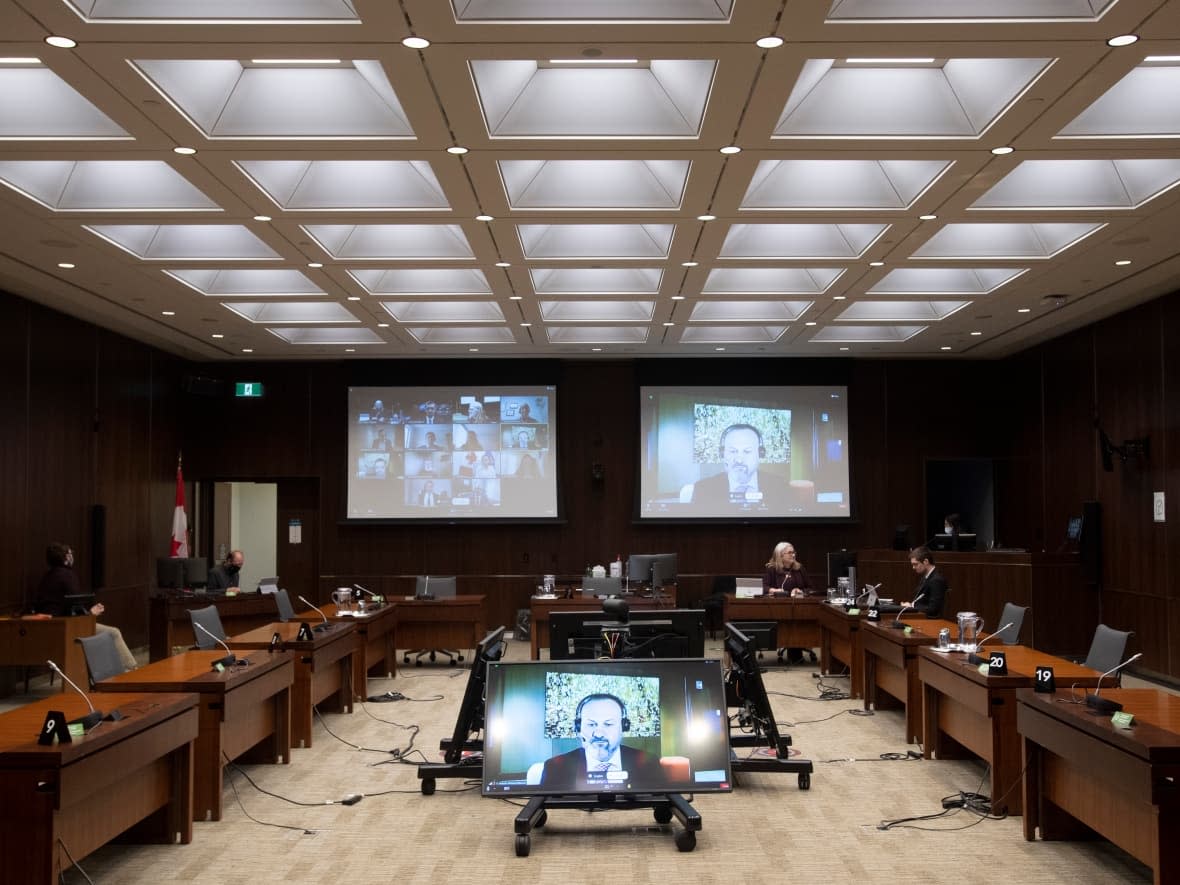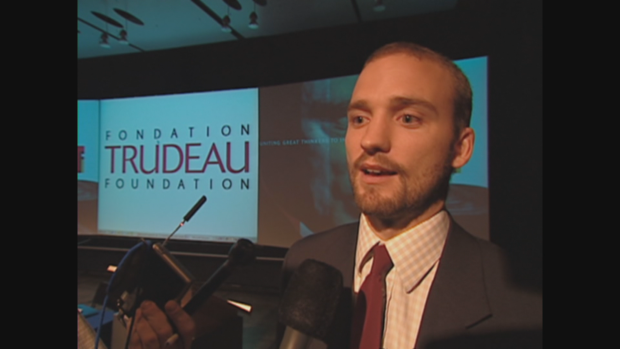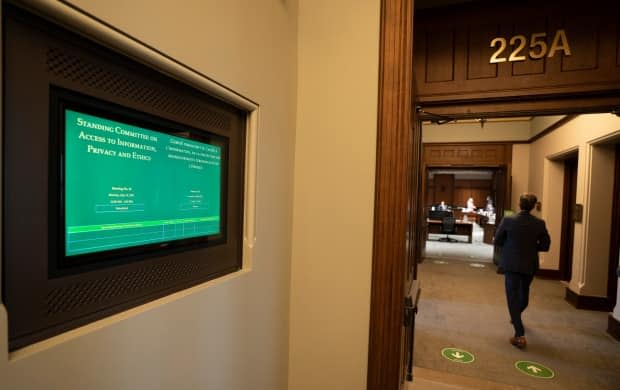Trudeau Foundation misled public by stating China-linked donation was Canadian: ex-official

The Pierre Elliott Trudeau Foundation misled Canadians when it said that a controversial donation made by two Chinese businessmen qualified as a Canadian donation, the former president of the foundation told MPs on Friday.
Testifying before the House of Commons ethics committee, Pascale Fournier said her predecessor Morris Rosenberg told the National Post in December 2016 that the foundation didn't consider the donation to be foreign money because it was made by a company incorporated in Canada.
"This was a declaration on behalf of the foundation to say that it was not foreign money, that it was Canadian money," Fournier told MPs. "This was in the annual report as well. When, in fact, the tax receipt itself mentions China.
"So, I think this is something that is misleading to Canadians."
Rosenberg, however, said he never intentionally misled anyone about the donation and would welcome a public inquiry into the affair.
"I absolutely deny that I ever had any intention to mislead anybody about anything," Rosenberg told CBC News. "Anybody who knows me knows that I operate at a very high ethical level."
Rosenberg, who is expected to testify before the committee Tuesday, said the only communication he has received from the foundation since the controversy erupted was one text message in early March citing its press release about giving back the donation.
"Given that all of this happened under my watch, nobody ever asked me what was going on," Rosenberg said. "Nobody ever asked me to come in and look at any of these documents."
Fournier's testimony is the latest twist in a complicated tale involving a $200,000 donation to the foundation — $60,000 of which was never sent. Because the donation was made to fund conferences centred on Canada-China relations which were never held, Fournier said, the money was never spent.
More light is expected to be shed on the donation Wednesday when Prime Minister Justin Trudeau's brother Alexandre Trudeau, who is involved in the foundation, is scheduled to testify.

Speaking to reporters in New York City, the prime minister said his brother has been involved in the foundation for years and will answer the questions MPs ask of him.
"It's my brother," he said. "I love him very much but he does his things and I do mine."
In the House of Commons, the prime minister has said repeatedly he has not been involved with the foundation that bears his father's name for a decade and was not involved at the time of the donation.
The committee voted Friday to call for Trudeau Foundation documents and to also call Edward Johnson, a founding member of the foundation and a former aide to Pierre Trudeau, to testify. In the wake of Fournier's testimony, the foundation reportedly has asked the committee for permission to testify.
On Friday, Fournier told MPs said she dug into past e-mails related to the 2016 donation that had been attributed to two Chinese businessmen — Bin Zhang and Niu Gensheng — after news reports earlier this year raised questions about whether the donation had been made at the behest of the Chinese government.
'Under the guidance' of Beijing
Fournier said the e-mails revealed the foundation corresponded with the Chinese Cultural Industry Association, which told the foundation which name should be listed on the tax receipts for the donation and where they should be sent.
Asked by NDP MP Matthew Green about the role Bin Zhang played, Fournier said he was involved with the Chinese Cultural Industry Association that corresponded with the foundation about the donation.
"What I did notice was that he was the chair of the board of that association based in China," Fournier said. "That association was in relationship with the [Chinese] government, he was the chair of that association and he was one of the donors."
Fournier was asked if the association was an extension of the Chinese government. "There was a very strong proximity," she said.
"I don't know if I would say extension but it was clearly under the guidance, I think, was the expression used on their website. Under the guidance of the government."
Fournier said her research also revealed that while one receipt was issued in the name of a company — Millennium Golden Eagle — with an address in China, the second was issued in the name of the same company but with an address in Quebec.
Searches by CBC News of corporate records show that Millennium Golden Eagle (Canada) was federally incorporated on April 20, 2012. Its first filings show two directors: Bin Zhang, with an address in Beijing and phone number from China; and Guojun Hu, whose residence at the time in Brossard, Que. was also listed as the company's address.
The company's articles of incorporation state that meetings of the company's shareholders "may be held outside Canada in China."
Later filings showed the company's registered address as a mansion in Dorval, Que. that Zhang purchased in October 2012. That mansion is still listed as the company's address but in the latest filings with the Quebec government, Zhang's address is listed in Beijing.
The board split over call for probe: Fournier
Fournier told MPs her calls for an investigation by lawyers and accountants, and for directors on the board at the time of the donation to recuse themselves from the file, led to a split in the foundation's board and her resignation, along with those of several board members.
Fournier said the donation contract was signed before she joined the foundation but the story prompted her to look into it more closely.
Green asked if it could be inferred that the Chinese government influenced the negotiations on the donation.
"Possibly," replied Fournier. "That's why I wanted to have an unrestricted forensic audit to understand what had happened before I became president and CEO of the foundation."
Fournier said the foundation decided to reimburse the donation before she realized that the cultural association may have had ties to the Chinese government.
Fournier testified that the foundation tried between March 1 and March 23 to deliver the $140,000 reimbursement cheque to the donor but was unsuccessful. She did not say whether the attempt to return the donation was made in Canada or in China.
Rosenberg said he doesn't recall the foundation carrying out its own verification of the donors at the time because the University of Montreal found the donors and the foundation "came on after."
Rosenberg said the donation followed an earlier donation by the same two businessmen to the University of Toronto and occurred at a time when Canada-China relations were warming.
"As far as the Trudeau Foundation was concerned, getting a donation to put on conferences on an issue — China-Canada relations, China in the world — was very consistent with one of its overall themes, which is Canada's role it the world," Rosenberg said. "We didn't think there was anything untoward about that, just as the University of Montreal didn't."

On April 12, Edward Johnson, chairman of the foundation, announced the foundation would look into the donation.
"Following a unanimous consensus reached by the Board prior to its dissolution, the Pierre Elliott Trudeau Foundation is launching an independent review of its acceptance of the donation with a potential connection to the Chinese government," he wrote in a statement at the time. "This review will be conducted by an accounting firm instructed by a law firm, neither of which were previously involved with the Foundation."
Rosenberg, who said he told the foundation from the start that he was only prepared to serve one term of four years, said he wants to get to the bottom of what happened.
"I really would welcome an independent inquiry into this because it has reputational harm to people, including the foundation. And I think it would be a shame if the foundation didn't continue its work," he said.
"It has done very, very good work and helped an awful lot of people, some of whom came from poorer backgrounds, who would have never been able to do the research work that they did."
Elizabeth Thompson can be reached at elizabeth.thompson@cbc.ca


